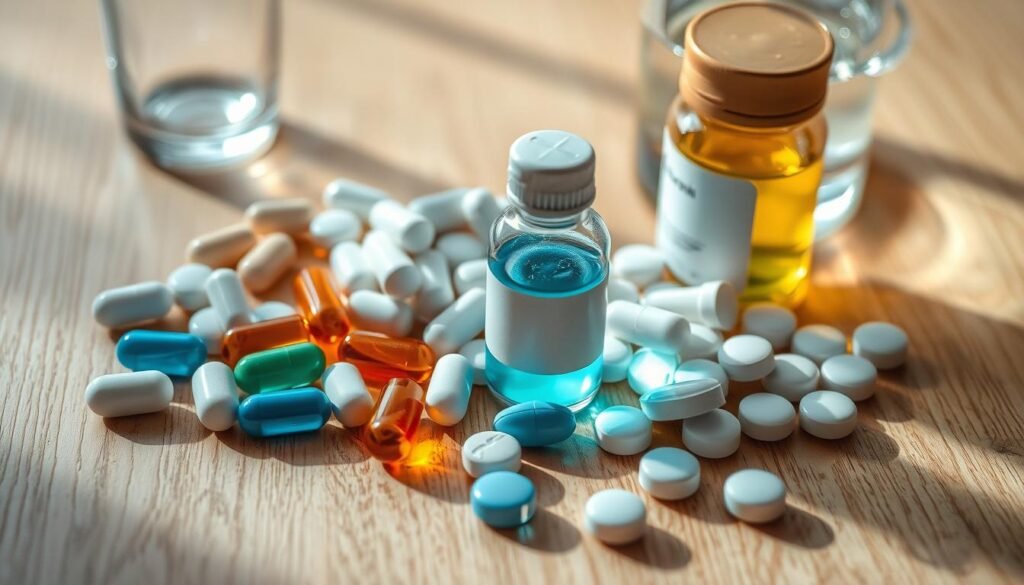Did you know that about 31% of adults in the U.S. have had anxiety disorders sometime? Mental health issues are becoming more common. It’s important to have good treatments available. Hydroxyzine, an antihistamine, is gaining popularity as an anxiety treatment. In this guide, we’ll look at the right dosage of hydroxyzine for anxiety. We want to ensure people get the help they need while staying safe.
Key Takeaways
- Hydroxyzine is a commonly prescribed medication for anxiety treatment.
- The typical dosage for adults ranges from 50 mg to 100 mg, taken four times a day.
- Children’s dosages vary based on age and weight, typically between 50 mg and 0.6 mg/kg.
- Hydroxyzine is not recommended for long-term use, focusing instead on short-term relief.
- Consulting a healthcare provider is crucial for determining the appropriate dosage tailored to individual needs.
Understanding Hydroxyzine and Its Uses
Hydroxyzine has various uses in medicine, mainly to treat anxiety. As an antihistamine, it eases allergic reactions and anxiety symptoms. There are two types: hydroxyzine hydrochloride and hydroxyzine pamoate. Both are used for therapy. Knowing how hydroxyzine works helps us see its importance in anxiety and allergy treatments.
What is Hydroxyzine?
Hydroxyzine is an antihistamine. It stops the actions of histamine that cause allergies and anxiety. It comes in oral tablets. Although Atarax, a known brand, isn’t sold now, generic forms are used. These generics are safe and affordable. They help with anxiety and are used as sedatives before surgeries. People feel better about 30 minutes after taking them.
Common Conditions Treated with Hydroxyzine
Hydroxyzine is used for many health issues, especially for calming anxiety. It helps people feel more relaxed. Conditions treated with it include:
- Anxiety relief and management
- Allergic skin conditions like chronic urticaria
- Help before and after surgery
It’s mainly known for helping with anxiety, as the FDA supports it for this. Looking for ways to handle anxiety better? There are many resources out there. Learning more from educational resources can help people know more about their anxiety.
How Hydroxyzine Works for Anxiety
It’s important to know how hydroxyzine helps with anxiety. This medicine is an antihistamine. It helps by calming the brain’s reaction to anxiety. Hydroxyzine blocks certain reactions in the body, which makes people with acute anxiety feel better.
The Mechanism of Action
Hydroxyzine works by slowing down some brain signals that cause anxiety. It acts fast, often in 15 to 30 minutes. This is much quicker than many other anxiety medicines.

Hydroxyzine is good for short-term anxiety relief. Studies show it might become less effective over time. This means it’s more of a quick fix than a permanent solution.
Comparison with Other Anxiety Medications
Hydroxyzine and other anxiety meds have some key differences. Hydroxyzine doesn’t lead to addiction as easily, which many patients like. But, just like any medicine, it can have side effects to watch out for.
| Medication Type | Speed of Action | Dependence Risk | Common Side Effects |
|---|---|---|---|
| Hydroxyzine | Fast (15-30 mins) | Low | Drowsiness, dry mouth, headache |
| Benzodiazepines | Moderate (30-60 mins) | High | Drowsiness, dizziness, risk of addiction |
| SSRIs | Slow (weeks) | Low | Insomnia, weight gain, sexual side effects |
In summary, hydroxyzine is a quick and less addictive way to manage anxiety. By understanding how it works, people can choose the best option for them.
Hydroxyzine Dosage for Anxiety
It’s key to know the right hydroxyzine dosage for anxiety for both kids and adults. Hydroxyzine helps manage anxiety effectively. The right dose depends on age and the person’s individual needs.
Recommended Dosages for Adults
Adults usually take 50 to 100 milligrams for anxiety and tension. This is done four times daily. No one should take more than 400 milligrams in a day. It’s important to follow your doctor’s advice closely to stay safe.
Dosage Guidelines for Children
For hydroxyzine dosage for children, the amount varies by age. Kids six and older often get 50 to 100 milligrams daily, in split doses. Those younger than six might only get up to 50 milligrams daily. Every pediatric hydroxyzine dose must be decided by a healthcare provider for safety.
| Age Group | Indication | Recommended Dosage | Frequency |
|---|---|---|---|
| Adults | Anxiety | 50-100 mg | 4 times daily |
| Children (6 years and older) | Anxiety | 50-100 mg | Daily, in divided doses |
| Children (under 6 years) | Anxiety | Maximum 50 mg | Daily |
| Adults | Allergic Reactions | 25 mg | 3-4 times daily |
| Children (6 years and older) | Allergic Reactions | 50-100 mg | Daily, in divided doses |
| Children (under 6 years) | Allergic Reactions | Maximum 50 mg | Daily |

Administering Hydroxyzine: Forms and Dosage Instructions
Hydroxyzine comes in various forms, including oral tablets and syrup. These forms aim to cater to different patient needs. Understanding the available types and their proper use is crucial. This is especially true for those using hydroxyzine to manage anxiety.
Available Forms of Hydroxyzine
Patients have several options for hydroxyzine forms. They can select based on their personal and medical needs. The main forms are:
- Hydroxyzine oral tablet (available in strengths of 10 mg, 25 mg, and 50 mg)
- Hydroxyzine syrup
- Injectable solutions
How to Take Hydroxyzine Medications
Hydroxyzine dosage should be followed as directed by a healthcare professional. For hydroxyzine oral tablets, adults often take 50 to 100 mg four times daily for anxiety. For children 6 years and up, the recommended dose for anxiety is 50 to 100 mg per day, spread out over several doses.
Here are some important points when taking hydroxyzine:
- Hydroxyzine can be taken with or without food.
- Do not crush or chew hydroxyzine oral tablets, as it affects their effectiveness.
- Dosages for children are typically based on body weight, around 0.6 mg per kilogram for sedation before procedures.
- Store hydroxyzine properly in a closed container at room temperature, away from heat, moisture, and light.
Always adhere to the instructions given and consult healthcare providers if you have questions about hydroxyzine.

| Form | Recommended Dosage | Indications |
|---|---|---|
| Oral Tablet | 50 to 100 mg, 4 times daily. | Anxiety, itching, sedation |
| Syrup | 50 to 100 mg per day for children, divided doses. | Convenient for children who may have difficulty swallowing pills. |
| Injectable | Dosage based on clinical indication. | Used in medical settings for more immediate action. |
Special Considerations Before Using Hydroxyzine
It’s vital to understand how safe hydroxyzine is for treatment. Patients must pay attention to hydroxyzine allergy warnings and hydroxyzine contraindications. This makes your treatment safer. Knowing about possible allergies to hydroxyzine is key before starting.
Allergy and Contraindications
Hidden allergies can cause serious reactions. If you’re allergic to hydroxyzine, tell your healthcare provider. For people with heart or breathing problems, there are special warnings. Knowing this helps avoid bad reactions.
Consulting Your Doctor
Talking to your doctor before starting hydroxyzine is smart. Share your medical history and any medicines you’re taking. This prevents harmful interactions. Getting the right hydroxyzine and medical advice helps customize your treatment. This makes the therapy process smoother.
Hydroxyzine and Drug Interactions
It’s very important to understand hydroxyzine drug interactions for safe use. This drug can mix with others and cause problems that need attention. By knowing these interactions, you can avoid bad effects and make hydroxyzine work better.
Potentially Severe Interactions
Hydroxyzine can seriously mix with certain drugs like bepridil, cisapride, and some CNS depressants. Mixing them can make side effects like feeling sleepy and dizzy worse. Here are some major concerns:
- Benzodiazepines: Hydroxyzine and drugs like alprazolam increase the risk of CNS depression.
- Opioids: Using it with opioids, such as fentanyl, can make you more sleepy.
- Antipsychotics: Some antipsychotics can cause long QT syndrome when used with hydroxyzine.
- Antifungals: Certain antifungals raise the risk of QT syndrome too.
Common Drug Interactions to Be Aware Of
There are also common hydroxyzine interactions to keep in mind. Knowing these helps you talk better with your healthcare team. Hydroxyzine commonly interacts with the following drugs:
| Drug Class | Examples | Interaction Type |
|---|---|---|
| Benzodiazepines | Alprazolam, Diazepam | Increased sedation |
| Opioids | Fentanyl, Oxycodone | Enhanced CNS depression |
| Antidepressants | Amitriptyline, Fluoxetine | Increased sedative effects |
| Other Antihistamines | Diphenhydramine, Loratadine | Heightened sedation |
| Antacids | Aluminum hydroxide, Magnesium hydroxide | Reduced absorption of hydroxyzine |
Always tell your doctor about all the meds you’re taking, even the over-the-counter ones and herbal supplements. This way, they can keep an eye on hydroxyzine interactions and adjust your treatment if needed.
Possible Side Effects of Hydroxyzine for Anxiety
Hydroxyzine is often recommended for treating anxiety. However, it can cause side effects like drowsiness, dizziness, dry mouth, and headaches. Most people handle these effects without much trouble. But they can make daily tasks challenging. It’s critical to watch for hydroxyzine anxiety treatment side effects closely. Knowing about these effects is key to managing treatment well.
Frequent Side Effects
Common side effects of hydroxyzine include:
- Drowsiness
- Dizziness
- Dry mouth
- Headache
- Gastrointestinal distress
Elderly people might feel these effects more strongly. Issues like confusion and extreme drowsiness can really impact their life. It’s important to keep a close eye on them to ensure their safety.
Serious Side Effects That Require Attention
Sometimes, hydroxyzine can cause serious side effects. These include heart rhythm problems, bad allergic reactions, and skin conditions getting worse. If these occur, getting help right away is essential. Other urgent symptoms are:
- Chest pain
- Cough
- Difficulty swallowing
People with heart issues, electrolyte imbalances, or skin conditions should be cautious with hydroxyzine. Talking regularly with a doctor can help handle these risks while treating anxiety.
Hydroxyzine for Panic Attacks
Panic attacks affect many people in the U.S., with over 40 million adults facing anxiety disorders. Hydroxyzine has been recognized as a helpful treatment for those sudden intense fear episodes. As an FDA-approved option, it offers quick relief from the sharp anxiety felt during a panic attack.
Use Cases in Panic Attack Management
In urgent situations, hydroxyzine is a top choice for handling panic attacks. It works by blocking certain receptors in the brain, calming you down quickly. Studies have shown that a dose of about 50 mg of hydroxyzine can really help against anxiety.
Efficacy and Limitations
While hydroxyzine is great for quick relief, it’s part of a bigger treatment plan. Relying on it too much isn’t advised because it doesn’t solve the root problem of panic attacks. It’s important to work with healthcare providers for a full treatment strategy. They’ll help balance the pros and cons of using hydroxyzine.